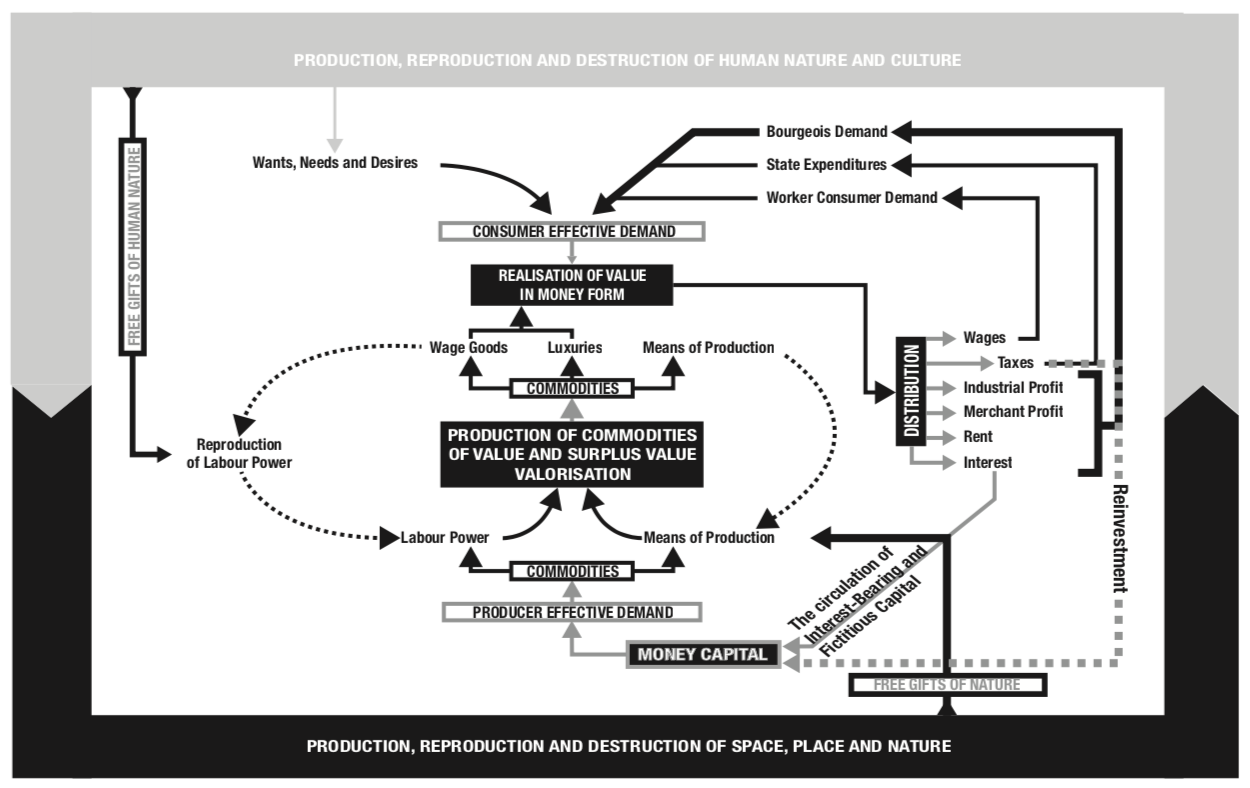[Lead bloggers: Erik Forman, Miryam Nacimento, Youssef Ramez]
In this week’s lecture, Prof. David Harvey outlined a framework for understanding the development of social relations under capitalism as a totality, and used this framework to described the shift to neoliberalism in the late 1970s.
The framework draws on a footnote in Chapter 15 of Vol. 1 of Capital, in which Marx describes the reciprocally deterministic relationship between technology, nature, production, reproduction, social relationship, and the mental conceptions that hold it all together as the totality of life under capitalism. Harvey adds “institutional arrangements” to this list and dubs these “activity spheres” or “moments.” He describes the relationship between these activity spheres as co-evolutionary, but with each maintaining the possibility of transformations that create contradictions and force change across the system. Transformations in each activity sphere that could result from human agency, tendencies immanent within the system, nature, or other impetus.
As Harvey writes in Enigmas of Capital, “if, as Marx once averred, our task is not so much to understand the world as to change it, then, it has to be said, capitalism has done a pretty good job of following his advice.” From responses to labor insurgency, to developing technology to increase extraction of surplus value from workers, dominating nature, or creating new forms of social organization, capital has revolutionized itself again and again.
Prof. Harvey gives us a strong case in point– the neoliberal turn in capitalism of the late 1970s. He describes how the protection of the hegemony of the capitalist class from multiple insurgences and economic stagnation required new mental conceptions and institutional arrangements– which economists like Hayek, Friedman, and the Chicago School were happy to provide. Neoliberal economic doctrine called for the retreat of the state from subsidizing social reproduction, privatization of public services, withdrawal of environmental and labor protections, free trade (no tariffs), essentially a return to laissez-faire economic liberalism. After early test cases in Allende’s Chile and New York City after the 1975 fiscal crisis, neoliberal thought became hegemonic in the IMF and other global financial institutions. Neoliberal economic theory was “instatiated” into common sense of how you are supposed to run a government. Harvey cites a cycle of meetings and conferences in the late 1970s bringing together members of the capitalist class as the locus where neoliberalism as a class project was consolidated.
Neoliberalism has endured now for nearly half a century, but it has been fraught with contradictions and conflict the entire time. While neoliberalism mobilized the rhetoric of freedom and choice, in fact it also resulted in an intensification of state repression of social movements and labor, a core paradox. To maintain hegemony, neoliberal elites are forced to rely on undemocratic tools of governance, such as the WTO and other transnational institutions, discipline labor with the threat of international competition, union-busting, and outright violent repression.
Harvey pointed out that neoliberalism often leads to an increase in nationalism as a backlash against the globalization of capital, often in the form of right-wing populism. This was visible already in the mid-1990s in the UK, but appears to be entering a new phase now with Brexit, Trump, and in Germany the AfD.
Economic contradictions are also a source of volatility, as Harvey illustrates in his description of deregulation of capital flows that led to the 2007/2008 Financial Crisis. While some have claimed that the crisis led to the end of neoliberalism, Harvey claims neoliberalism is alive and well, but has lost legitimacy and justification, with the capitalist class turning increasingly to authoritarianism to cement its rule, winning consent for repression through right-wing populism.
Questions
- Neoliberalism has lost legitimacy without losing power. While a turn to increased authoritarianism to secure the present social relations seems to be in progress, are there other evolutions of the totality we would hope for, and how would we win them?
- Of the activity spheres that Harvey outlines as constituent of the totally of relations under capitalism, which presents the greatest opportunity for intervention, or is it possible or necessary to construct a project that integrates intervention in all or several? Are there historical examples we can look to for inspiration of efforts to break with capitalist social relations?
- Why did Marx privilege the proletariat as an agent of change, and is it predisposed to power to intervene in specific activity spheres over others? Are other subjects more likely to be able to leverage change in the world system today? Why or why not?
- As critics of capitalism, we have a model that describes the totality of capitalist social relations, and can theorize about how events and trends result mutations in the system. In the 1970s, the United States was still close to the zenith of its power, the EU did not yet exist, the state socialist world was “contained” through proxy wars; as a result, the capitalist class was relatively organized and united on a global level and was able to come to a consensus on how to emerge from the crisis of the early 1970s. Today, China has created an alternative set of global financial institutions and arrangements, US hegemony is fading fast, and regional powers are jockeying for position. Capitalism is more global than ever before, but the liberal postwar order has never been weaker and world-systemic chaos is escalating. At this point in history, how and where is capital making decisions, or is history unfolding “behind the backs” of it participants, as Marx would say? What does this mean for efforts to build anti-systemic movements?
- How are we to understand the interplay between the neoliberal corporate elite and the state? If neoliberalism is to be understood as a capitalist class project that has been able to capture the state apparatus revealing its authoritarian nature (against its supposed ideals of freedom, equality and liberation), where could strategic anti-capitalist actions take place? what kind of anti-capitalist action does the authoritarian nature of neoliberalism demand?


